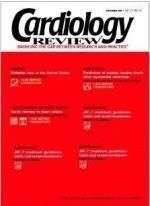Publication
Article
Cardiology Review® Online
Identifying heart failure patients who benefit from advanced therapies Richard Stewart, MD
The study by Radovancevic and colleagues (page 31) focuses on iden-tifying patients with New York Heart Association (NYHA) class III or IV heart failure who would be appropriate candidates for advanced treatments, such as left ventricular assist device implantation or cardiac transplantation. The authors retrospectively analyzed 241 patient records to determine which clinical factors would significantly contribute to risk stratification and identification of patients who would benefit the most from these rather sophisticated and costly therapies.
All patients had elevated B-type natriuretic peptide (BNP) levels that
exceeded 400 pg/mL. Of the patients with advanced heart failure, 51% (n = 122) had prolonged corrected (QTc) intervals on electrocardiographic (ECG) analysis and 49% had normal QTc intervals. The group of heart failure patients with normal QTc intervals had a survival rate three times higher than that of the prolonged QTc group (P < .001). Multivariate analysis showed a prolonged QTc interval was an independent predictor of all-cause mortality, sudden cardiac death, and left ventricular pump failure. QTc interval prolongation was also the only independent predictor of the need for implantation of a left ventricular assist device. Patients who received these devices had normal QTc intervals after the procedure.
The results from this retrospective analysis strongly suggest that a simple review of the 12-lead ECG could identify heart failure patients who would benefit the most from advanced device-based and surgical therapies. Risk stratification of patients with prolonged QTc intervals is clearly a more specific criterion
for identifying appropriate patients for device-based therapies and cardiac transplantation when non-
specific criteria, such as BNP levels, are elevated.
The clinical significance of these data are profound. BNP levels have been shown to be most useful when used in conjunction with other clinical and laboratory markers. In patients with NYHA III or IV heart failure characterized by elevated BNP levels, the therapeutic options can range from optimizing medical therapy to more sophisticated therapies, such as device implantation or cardiac transplantation. The latter carries a unique set of risks and puts stress on the health care resources
in this country. By identifying patients who would benefit and respond to these therapies, we can improve survival and quality of life in a cost-effective manner.
Conclusion
The multivariate analysis of the potential predictors showed that QTc prolongation is a significant
predictor of sudden cardiac death, left ventricular pump failure, and
response to left ventricular assist device implantation. These patients would clearly benefit from either device implantation or cardiac transplantation. At the very least, these criteria could be used to identify high-risk patients who would benefit from very close clinical follow-up and possible in-hospital monitoring before these sophisticated therapies are carried out.






